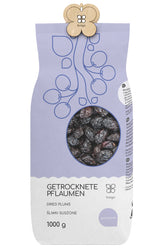In a time when more and more people are switching to a gluten-free diet, the question arises: Is this really necessary or just a trend? As the online organic store MarktBio.com, we want to provide you with the facts and myths about gluten in this blog post. Learn who can benefit from a gluten-free diet and what you should consider.
What is gluten, actually?
Gluten is a protein complex found in grains like wheat, rye, barley, and oats. It is responsible for the elasticity and consistency of baked goods, making bread, pasta, and other products so palatable. For most people, gluten is completely harmless. However, there are some conditions where avoiding gluten-containing foods may be beneficial.
Celiac disease—when the body cannot tolerate gluten
The most well-known condition related to gluten is celiac disease. It is an autoimmune disorder where the body reacts to gluten consumption by damaging the intestinal lining. The consequences can include nutritional deficiencies, diarrhea, stomach pain, and even weight loss. For those affected, a lifelong, strict gluten-free diet is essential.
Non-celiac gluten sensitivity
Besides celiac disease, there is another form of gluten intolerance called non-celiac gluten sensitivity (NCGS). Here, the body also reacts sensitively to gluten without an autoimmune condition like celiac disease. The symptoms resemble those of celiac disease but are usually less severe. A gluten-free diet can also provide relief in this case.
Wheat allergy—when the body cannot tolerate wheat
A wheat allergy is another form of intolerance to gluten-containing foods. In this case, the immune system reacts allergically to certain proteins in wheat. Unlike celiac disease, the issue here is not gluten but other components of wheat. Symptoms of a wheat allergy can include skin rashes, stomach pain, or breathing difficulties.
Myths and facts about gluten-free diets
Although the mentioned conditions are relatively rare, gluten-free diets are very popular. Many people expect health benefits from them. But is this really true? Let's take a closer look at the most common myths and facts.
Myth 1: A gluten-free diet is healthier
In fact, there is no evidence that a gluten-free diet is healthier for people without gluten intolerance. On the contrary: many gluten-free products contain more fat, sugar, and salt to compensate for the missing flavor of gluten. Additionally, they are often lower in fiber than their gluten-containing counterparts. Therefore, those without celiac disease or NCGS should focus on a balanced, varied diet—with or without gluten.
Myth 2: Gluten-free diet aids weight loss
Here too, there is no proof that avoiding gluten automatically leads to weight loss. What's decisive for weight loss is rather the calorie content and nutrient density of foods. Gluten-free products can even contain as many or more calories as their gluten-containing alternatives. Those wanting to lose weight should instead focus on fiber-rich, nutrient-dense foods - regardless of gluten content.
Myth 3: Gluten-free diet boosts performance
Again, there is no scientific evidence that a gluten-free diet enhances physical or mental performance. As long as no gluten intolerance exists, avoiding gluten provides no advantage. More important are a balanced diet, sufficient exercise, and rest.
When is a gluten-free diet beneficial?
As we've seen, a gluten-free diet is unnecessary for most people. However, there are some cases where avoiding gluten can indeed be beneficial:
-
For celiac disease: For people with celiac disease, a lifelong, strict gluten-free diet is essential to avoid symptoms and prevent complications.
-
For non-celiac gluten sensitivity (NCGS): Here too, a gluten-free diet can alleviate symptoms if an intolerance has been diagnosed.
-
For wheat allergy: Affected individuals must avoid wheat and other gluten-containing grains to prevent allergic reactions.
-
If intolerance is suspected: If you experience symptoms like bloating, diarrhea, or stomach pain after consuming gluten-containing foods, a self-experiment with a gluten-free diet may be useful. However, always consult a doctor.
Otherwise, a balanced, varied diet with or without gluten is the best path to greater well-being. Simply ensure your meals are nutrient-rich and make you feel good.
Conclusion: Gluten-free diet - neither a panacea nor the devil's work
In summary, it can be said: A gluten-free diet is neither necessary nor particularly healthy for most people. Only in cases of diagnosed gluten intolerance or wheat allergy does avoiding gluten actually provide benefits. Otherwise, a balanced, fiber-rich diet with or without gluten is the best path to greater well-being. So don't listen to trends, but to your body - and when in doubt, consult a doctor.































































































































